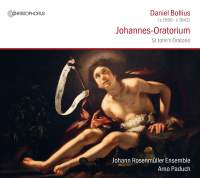Texte paru dans: / Appeared in: |
|
|
Outil de traduction ~ (Très approximatif) |
|
|
Reviewer: J.
F. Weber Daniel Bollius (c. 1590–c. 1642) is a composer who is not in my collection, nor in the Fanfare Archive, nor in a recent issue of the annual Bielefelder Katalog Klassik. This seems to be the first recording of his music. He was the Kapellmeister to the Elector-Archbishop of Mainz, but little else is known about him. In 1614 the archbishop built a second residence for himself, calling it Schloss Johannisburg. A few years later, Bollius had taken his position at the cathedral and composed this “musical representation on the conception and birth of St. John the Baptist.” (How many readers looked at the title and thought, “Passion according to St. John the Evangelist?” Wrong. But that is the title given in the notes, translating from the original Johannes-Oratorium.) I cannot think of another treatment of the present subject. The cast of characters occurring in Luke’s gospel narrative is impressive, for after an introduction of Isaiah’s prophecy, the events narrated involve Luke himself, the archangel Gabriel, Zachary, Elizabeth (the parents of John), the Virgin Mary (at the Visitation), and finally a word from John himself describing his early life. The text is entirely Scriptural, beginning with the prophecy of Isaiah that includes the words, “The Lord called me from the womb.” It then uses the text of Luke 1:5–80, omitting only the passage that tells of the annunciation to the Virgin Mary. Luke is the narrator, and the dialog is assigned to the individuals and to the crowd. Since the work begins with a symphonia, it ends with another for symmetry, although the preceding choral epilogue (a setting of the Magnificat antiphon for Vespers of the feast day, June 24) is far more climactic. To restore a more suitable ending, a short motet in praise of Christ is added. Johannes-Oratorium is a slightly anachronistic abbreviation of the longer title cited above. At this time the Italian oratorio had not penetrated into Germany, and the term “historia” first came into use there, as in Schütz’s Historia der Auferstehung J. C. of 1623, shortened to Easter Oratorio. But the notes speculate that Bollius was familiar with the development of the oratorio in Italy after Cavalli in 1600. The date of composition is also speculative, for Bollius could not have arrived in Mainz before 1618, and the archbishop died in 1626, setting the limits. Guesswork centers on 1623, the archbishop’s 70th birthday. Incidentally, John is the patron of archbishop Johann Schweikhard von Kronberg. Somehow this and the rest of Bollius’s manuscripts ended up in Breslau (the present-day Wrocław in Poland), stolen by the Red Army as the city fell in 1944, and deposited in Moscow. From the 1960s, a great deal of war booty of this kind was gradually returned to its owners, but this work of Bollius ended up in East Berlin rather than in Wrocław until its final return after 1990. The neglected work was not entirely unknown, for in the 1930s Hans Joachim Moser was able to write it off for its “naïve rigidity” and “primitive awkwardness,” misunderstanding that the simple lines of melody needed to be ornamented in performance.
The work
receives a stylish, well-sung performance from an ensemble that I have not
encountered before. Colleague James A. Altena reviewed a recording from a
generation later, a Mass and other works by Johann Kerll (Fanfare 36:3). If
he found the soloists less impressive than the rest of the ensemble, I find
a different cast of soloists entirely gratifying. Paduch has focused his
attention entirely on the 17th-century German Baroque, so his willingness to
bring this neglected work to light is understandable. I applaud his
enterprise and the success of his endeavor. This is something new for lovers
of the period. | |
|
|
|
|
Cliquez l'un ou l'autre
bouton pour découvrir bien d'autres critiques de CD |
|




